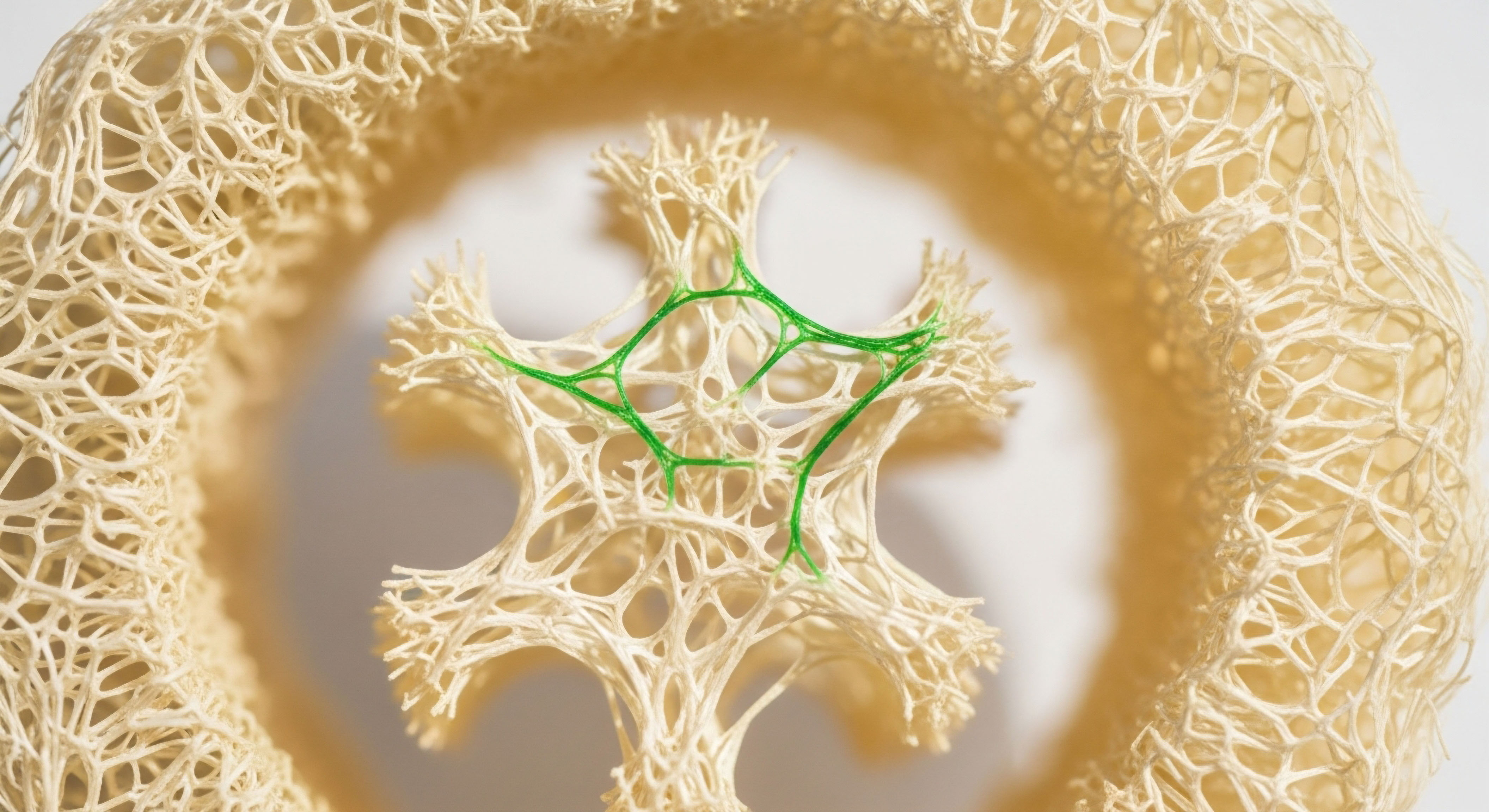

Fundamentals
When your body feels out of sync, when the energy you once knew seems to have faded, or when familiar symptoms like persistent fatigue, mood shifts, or changes in body composition begin to settle in, it is natural to seek explanations. Many individuals attribute these experiences to the passage of time or the ordinary stresses of life.
Yet, beneath the surface, a more intricate biological conversation is taking place, one that often involves the delicate balance of your hormonal systems. Your personal experience of these shifts is not merely a collection of isolated symptoms; it is a direct signal from your internal physiology, indicating that certain foundational processes may require closer examination.
Hormones serve as the body’s internal messaging service, carrying vital instructions from one organ system to another. These chemical messengers regulate nearly every bodily function, from metabolism and mood to sleep and reproductive health. For these messages to be received and acted upon, specialized structures known as hormone receptors exist on the surface or inside cells.
Think of a hormone as a key and its receptor as a lock; when the correct key fits the lock, a specific cellular action is initiated. This precise interaction ensures that the body’s intricate network of functions operates with remarkable coordination.
A common misconception is that hormonal imbalances are solely about the quantity of hormones circulating in the bloodstream. While insufficient or excessive hormone production certainly plays a role, another equally significant, yet often overlooked, aspect is the sensitivity of these cellular locks.
Even with adequate hormone levels, if the receptors are not functioning optimally ∞ if the locks are sticky or partially blocked ∞ the cellular message may not be received effectively. This phenomenon, known as hormone receptor insensitivity, means that cells become less responsive to hormonal signals, leading to a cascade of downstream effects that manifest as the very symptoms you might be experiencing.
Your body’s symptoms are signals from its intricate hormonal messaging system, indicating potential receptor insensitivity rather than just hormone quantity.
The human body is a complex ecosystem, and no system operates in isolation. The digestive tract, often considered separate from endocrine function, holds a surprisingly central position in this hormonal dialogue. Within your gut resides trillions of microorganisms, collectively known as the gut microbiome.
This vast community of bacteria, fungi, and viruses plays a profound role in digestion, nutrient absorption, and immune system regulation. Emerging scientific understanding reveals that the gut microbiome also exerts considerable influence over hormonal health, acting as a silent partner in the body’s endocrine symphony.
Disruptions within this gut ecosystem, a state termed dysbiosis, can initiate a chain of events that impacts hormone receptor function. When the balance of beneficial and less beneficial microbes is disturbed, it can lead to increased inflammation and compromised integrity of the gut lining, often referred to as gut permeability or “leaky gut.” This compromised barrier allows substances that should remain confined to the digestive tract, such as bacterial endotoxins, to enter the bloodstream.
These circulating compounds can then trigger systemic inflammation, which has far-reaching consequences for cellular health and receptor responsiveness throughout the body.

Understanding Hormonal Signaling
The journey of a hormone begins with its synthesis in an endocrine gland, such as the testes, ovaries, or adrenal glands. Once released, it travels through the bloodstream to target cells equipped with the appropriate receptors. These receptors are highly specific, designed to bind only to their designated hormone.
This specificity ensures that each hormonal message is delivered precisely where it is needed, orchestrating a myriad of physiological responses. When this signaling pathway is disrupted at the receptor level, the body struggles to maintain its internal equilibrium, leading to a range of health challenges.

The Gut’s Role in Systemic Balance
The gut’s influence extends beyond digestion. It is a major site of immune activity and a significant producer of various compounds, including neurotransmitters and short-chain fatty acids, which can directly or indirectly affect hormonal pathways. A healthy gut barrier acts as a gatekeeper, preventing harmful substances from entering circulation while allowing beneficial nutrients to pass through.
When this barrier is compromised, the resulting systemic inflammation can interfere with the delicate machinery of hormone receptors, making them less receptive to their intended signals. This interconnectedness underscores why a holistic approach to wellness must consider the health of the digestive system as a foundational element for optimal endocrine function.


Intermediate
The concept of hormone receptor insensitivity, particularly when mediated by gut health, represents a critical area of investigation for those seeking to restore vitality. It moves beyond simply measuring hormone levels to understanding how effectively those hormones are being utilized at the cellular level.
When the gut microbiome is imbalanced or the gut lining is compromised, a state of chronic, low-grade inflammation can arise. This inflammation is not always overtly symptomatic; it can quietly interfere with cellular processes, including the ability of hormone receptors to bind their respective ligands and transmit signals efficiently.
Consider the analogy of a cellular radio receiver. Hormones are the radio waves, carrying specific broadcasts. Receptors are the antennae, designed to pick up these signals. If the antennae are corroded or surrounded by static ∞ analogous to inflammation or toxins from a compromised gut ∞ even strong radio waves may not be clearly received.
The cell, therefore, remains largely unaware of the hormonal message, leading to a diminished physiological response despite adequate hormone production. This diminished response can manifest as persistent symptoms, even when conventional lab tests show hormone levels within a “normal” range.
Gut-mediated inflammation can disrupt cellular hormone reception, leading to symptoms despite normal hormone levels.

Clinical Protocols and Gut Health Interplay
Addressing hormone receptor insensitivity often involves a multi-pronged strategy that includes optimizing gut health alongside targeted hormonal support. Protocols like Testosterone Replacement Therapy (TRT) for men and women, or Growth Hormone Peptide Therapy, aim to provide the necessary hormonal signals. However, their efficacy can be significantly influenced by the underlying cellular environment, which the gut profoundly shapes.

Testosterone Optimization in Men
For middle-aged to older men experiencing symptoms of low testosterone, such as reduced libido, fatigue, decreased muscle mass, and mood disturbances, TRT can be transformative. A standard protocol often involves weekly intramuscular injections of Testosterone Cypionate. To maintain natural testosterone production and fertility, Gonadorelin is frequently administered via subcutaneous injections twice weekly.
To manage potential conversion of testosterone to estrogen, an oral tablet of Anastrozole is typically prescribed twice weekly. Some protocols may also incorporate Enclomiphene to support luteinizing hormone (LH) and follicle-stimulating hormone (FSH) levels, further encouraging endogenous testosterone synthesis.
The effectiveness of these interventions can be amplified when gut health is simultaneously addressed. Systemic inflammation originating from the gut can impair androgen receptor sensitivity, meaning that even with exogenous testosterone, the cellular response might be suboptimal. Supporting gut barrier integrity and microbial balance can reduce this inflammatory burden, potentially allowing cells to respond more robustly to the administered testosterone.

Hormonal Balance for Women
Women experiencing symptoms related to hormonal changes, including irregular cycles, mood fluctuations, hot flashes, or diminished libido, can also benefit from targeted hormonal support. Protocols may include Testosterone Cypionate, typically administered weekly via subcutaneous injection at a lower dose (e.g. 10 ∞ 20 units or 0.1 ∞ 0.2ml).
Progesterone is prescribed based on menopausal status, playing a critical role in cycle regulation and overall well-being. For some, long-acting Testosterone Pellets may be an option, with Anastrozole considered when appropriate to manage estrogen levels.
The female endocrine system is particularly sensitive to systemic inflammation. Gut dysbiosis can alter the estrobolome, a collection of gut bacteria that metabolize estrogens, influencing their circulation and elimination. An imbalanced estrobolome can lead to estrogen dominance or inefficient estrogen clearance, further complicating hormonal balance and potentially affecting estrogen receptor sensitivity. Addressing gut health provides a foundational layer of support for these hormonal strategies.

Growth Hormone Peptide Therapy
Active adults and athletes seeking anti-aging benefits, muscle gain, fat loss, and improved sleep often explore Growth Hormone Peptide Therapy. These peptides stimulate the body’s natural production of growth hormone. Key peptides include Sermorelin, Ipamorelin / CJC-1295, Tesamorelin, Hexarelin, and MK-677. These agents work by mimicking or stimulating the release of growth hormone-releasing hormone (GHRH) or ghrelin, leading to a pulsatile release of growth hormone from the pituitary gland.
The effectiveness of growth hormone signaling, like other hormonal pathways, relies on receptor sensitivity. Chronic inflammation, often linked to gut health, can impair the function of growth hormone receptors, potentially diminishing the anabolic and regenerative effects of these peptides. Optimizing gut health can therefore create a more receptive cellular environment, allowing for a more pronounced and beneficial response to peptide therapy.

Other Targeted Peptides and Gut Connection
Beyond growth hormone secretagogues, other peptides offer specific benefits that can be indirectly influenced by gut health. PT-141, for instance, is utilized for sexual health, acting on melanocortin receptors in the brain to stimulate arousal. Pentadeca Arginate (PDA) supports tissue repair, healing, and inflammation modulation.
While their direct mechanisms are distinct from gut-mediated hormone receptor insensitivity, the systemic inflammatory state originating from a compromised gut can broadly affect cellular function and the overall physiological environment in which these peptides operate. A body free from chronic inflammatory burden is inherently more responsive to therapeutic interventions.
The intricate relationship between gut health and hormone receptor sensitivity underscores the importance of a comprehensive wellness strategy. It is not enough to simply provide the hormonal “keys”; ensuring the cellular “locks” are receptive is equally vital.
How Does Gut Dysbiosis Influence Hormone Receptor Responsiveness?
| Gut Health Factor | Mechanism of Influence | Potential Hormonal Impact |
|---|---|---|
| Gut Permeability | Allows bacterial endotoxins (LPS) into circulation, triggering systemic inflammation. | Reduces sensitivity of androgen, estrogen, and growth hormone receptors. |
| Microbial Dysbiosis | Alters production of short-chain fatty acids (SCFAs) and other metabolites. | Affects metabolic signaling, insulin sensitivity, and steroid hormone metabolism. |
| Estrobolome Imbalance | Disrupts estrogen metabolism and recirculation within the body. | Contributes to estrogen dominance or deficiency symptoms, affecting receptor binding. |
| Inflammatory Cytokines | Released during chronic gut inflammation, directly interfere with receptor signaling pathways. | Impairs cellular uptake and utilization of various hormones. |
Understanding these connections allows for a more targeted and effective approach to hormonal optimization. It shifts the focus from merely replacing what is missing to restoring the body’s innate capacity to receive and respond to its own vital signals.


Academic
The investigation into biomarkers indicating gut-mediated hormone receptor insensitivity represents a sophisticated intersection of endocrinology, immunology, and microbiology. This area of study moves beyond simplistic correlations, seeking to delineate the precise molecular and cellular mechanisms through which the gut microbiome and its metabolites influence the responsiveness of hormone receptors across various tissues.
The underlying premise is that chronic systemic inflammation, often originating from a compromised gut barrier and microbial dysbiosis, can directly interfere with the intricate signaling cascades that govern hormone-receptor interactions.
One primary mechanism involves the translocation of lipopolysaccharide (LPS), an endotoxin derived from the outer membrane of Gram-negative bacteria, across a permeable gut barrier. Once in systemic circulation, LPS activates toll-like receptor 4 (TLR4) on immune cells, triggering the release of pro-inflammatory cytokines such as Tumor Necrosis Factor-alpha (TNF-α), Interleukin-6 (IL-6), and C-reactive protein (CRP).
These inflammatory mediators are not merely markers of inflammation; they actively modulate cellular signaling pathways. For instance, TNF-α can directly inhibit insulin receptor signaling by inducing serine phosphorylation of insulin receptor substrate-1 (IRS-1), thereby impairing glucose uptake and contributing to insulin resistance. A similar mechanism is hypothesized for other steroid hormone receptors, where chronic inflammatory signaling can reduce receptor affinity or downregulate receptor expression.
Systemic inflammation from gut-derived LPS can impair hormone receptor signaling by activating pro-inflammatory cytokines.

Biomarkers of Gut-Mediated Insensitivity
Identifying specific biomarkers is paramount for a clinically informed approach to gut-mediated hormone receptor insensitivity. These markers can provide objective evidence of underlying physiological disruptions.
- Zonulin ∞ A protein that modulates the permeability of tight junctions between intestinal epithelial cells. Elevated serum zonulin levels indicate increased gut permeability, allowing for greater translocation of bacterial products into circulation. This serves as a direct indicator of a compromised gut barrier, a precursor to systemic inflammation.
- Lipopolysaccharide (LPS) and LPS-Binding Protein (LBP) ∞ Direct measurement of circulating LPS or LBP, which facilitates LPS binding to immune cells, provides evidence of bacterial endotoxemia. Elevated levels correlate with systemic inflammation and metabolic dysfunction, suggesting a direct link to impaired receptor sensitivity.
- Short-Chain Fatty Acids (SCFAs) ∞ Produced by beneficial gut bacteria through the fermentation of dietary fiber, SCFAs like butyrate, propionate, and acetate play critical roles in gut health and systemic metabolism. Reduced levels of beneficial SCFAs, particularly butyrate, can indicate dysbiosis and a diminished capacity for anti-inflammatory signaling, indirectly affecting receptor function.
- Inflammatory Cytokines ∞ Elevated levels of systemic inflammatory markers such as high-sensitivity CRP (hs-CRP), IL-6, and TNF-α are direct indicators of chronic inflammation that can interfere with hormone receptor signaling. These are often secondary to gut permeability and endotoxemia.
- Hormone Metabolites ∞ Analyzing urinary hormone metabolites (e.g. estrogen metabolites via 2-OH, 4-OH, 16-OH pathways) can reveal how the gut microbiome influences hormone clearance and detoxification. An imbalanced estrobolome can alter the ratio of these metabolites, potentially leading to a less favorable hormonal environment that impacts receptor responsiveness.

Interplay with Biological Axes
The gut’s influence extends to the major neuroendocrine axes, creating a complex web of interactions. The Hypothalamic-Pituitary-Gonadal (HPG) axis, which regulates reproductive hormones, is particularly susceptible. Chronic inflammation and stress, often exacerbated by gut dysbiosis, can suppress GnRH pulsatility from the hypothalamus, leading to downstream reductions in LH, FSH, and subsequently, gonadal steroid production (testosterone, estrogen).
Moreover, inflammatory cytokines can directly interfere with steroidogenesis in the gonads and reduce the expression or sensitivity of steroid hormone receptors in target tissues.
Similarly, the Hypothalamic-Pituitary-Adrenal (HPA) axis, the body’s central stress response system, is profoundly affected by gut health. Dysbiosis can alter the production of neurotransmitters and neuropeptides that modulate HPA axis activity, leading to chronic cortisol elevation. Sustained high cortisol levels can induce glucocorticoid receptor insensitivity, contributing to a state of chronic stress and further exacerbating systemic inflammation, creating a vicious cycle that impacts other hormone receptors.
What Are the Molecular Mechanisms Linking Gut Inflammation to Hormone Receptor Dysfunction?
The intricate relationship between the gut microbiome, systemic inflammation, and hormone receptor function underscores the need for a systems-biology approach in clinical practice. It highlights that optimizing hormonal health requires not only direct hormonal support but also a foundational focus on restoring gut integrity and microbial balance. This integrated perspective allows for a more comprehensive and ultimately more effective strategy for individuals seeking to reclaim their physiological vitality.
| Biomarker Category | Specific Markers | Clinical Significance |
|---|---|---|
| Gut Permeability | Zonulin, Diamine Oxidase (DAO), Lactulose/Mannitol Ratio | Indicates integrity of intestinal barrier; higher levels suggest “leaky gut” and potential endotoxemia. |
| Bacterial Translocation | Lipopolysaccharide (LPS), LPS-Binding Protein (LBP), Soluble CD14 (sCD14) | Direct evidence of bacterial products entering systemic circulation, triggering inflammation. |
| Systemic Inflammation | High-Sensitivity C-Reactive Protein (hs-CRP), Interleukin-6 (IL-6), Tumor Necrosis Factor-alpha (TNF-α) | Reflects chronic inflammatory state that can directly impair cellular receptor function. |
| Microbial Metabolites | Short-Chain Fatty Acids (Butyrate, Propionate, Acetate), Trimethylamine N-oxide (TMAO) | Indicates microbial balance and metabolic activity; imbalances can influence host metabolism and inflammation. |
| Hormone Metabolites | Urinary Estrogen Metabolites (2-OH, 4-OH, 16-OH), Androgen Metabolites | Reveals how gut microbiome influences hormone processing and detoxification, impacting receptor exposure. |
Can Targeted Gut Interventions Improve Endocrine Therapy Outcomes?
The ongoing research in this domain continues to refine our understanding, providing increasingly precise tools for assessing and addressing these complex interdependencies. The objective is to move beyond symptomatic management to address the root causes of cellular unresponsiveness, thereby enabling a more profound and lasting restoration of hormonal equilibrium.

References
- Hotamisligil, G. S. (2006). Inflammation and metabolic disorders. Nature, 444(7121), 860-867.
- Fasano, A. (2011). Zonulin and its regulation of intestinal barrier function ∞ the biological door to inflammation, autoimmunity, and cancer. Physiological Reviews, 91(1), 151-175.
- Cani, P. D. & Delzenne, N. M. (2009). The gut microbiome as a target for the management of the metabolic syndrome. Current Pharmaceutical Design, 15(13), 1416-1422.
- Riviere, A. et al. (2016). Bifidobacteria and butyrate-producing colon bacteria ∞ importance for our health. Frontiers in Microbiology, 7, 979.
- Tilg, H. & Moschen, A. R. (2006). Adipocytokines ∞ mediators linking adipose tissue, inflammation and immunity. Nature Reviews Immunology, 6(10), 772-783.
- Plottel, C. S. & Blaser, M. J. (2011). Microbiome and malignancy. Cell Host & Microbe, 10(4), 324-335.
- Stanczyk, F. Z. (2003). Estrogen replacement therapy ∞ the role of the gut microbiome. Journal of Clinical Endocrinology & Metabolism, 88(10), 4531-4537.
- Selye, H. (1950). Stress and the general adaptation syndrome. British Medical Journal, 1(4667), 1383-1392.

Reflection
As you consider the intricate dance between your gut and your hormones, a deeper understanding of your own biological systems begins to take shape. This exploration is not merely an academic exercise; it is an invitation to view your body not as a collection of separate parts, but as a deeply interconnected whole. The symptoms you experience are not random occurrences; they are coherent messages from an intelligent system striving for balance.
Recognizing the potential for gut-mediated hormone receptor insensitivity shifts the conversation from simply treating symptoms to addressing underlying physiological realities. It prompts a thoughtful inquiry into how your daily choices, from nutrition to stress management, influence the very cellular machinery that dictates your vitality. This knowledge empowers you to move beyond passive observation of your health to active participation in its recalibration.
Your personal journey toward reclaiming optimal function is unique, and the path forward requires a personalized approach. Armed with a deeper appreciation for the interplay between your gut and your endocrine system, you are better equipped to engage in meaningful dialogue with clinical professionals. This understanding serves as a powerful first step, guiding you toward protocols and strategies that honor your individual biology and support your inherent capacity for well-being.



